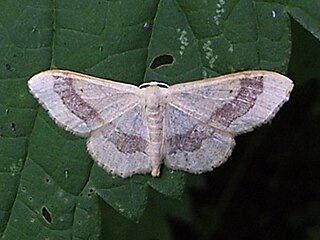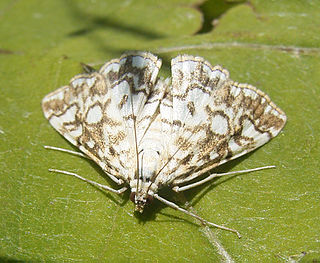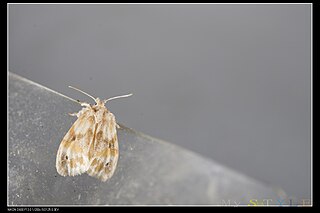Sir George Francis Hampson, 10th Baronet was an English entomologist.

Pyraustinae is a large subfamily of the lepidopteran family Crambidae, the crambid snout moths. It currently includes about 1,280 species Most of them tropical but some found in temperate regions including both North America and Europe.

Idaea, sometimes called Hyriogona, is a large genus of geometer moths. It was erected by Georg Friedrich Treitschke in 1825. They are found nearly worldwide, with many native to the Mediterranean, the African savannas, and the deserts of western Asia.

Spilomelinae is a very species-rich subfamily of the lepidopteran family Crambidae, the crambid snout moths. With 4,135 described species in 344 genera worldwide, it is the most speciose group among pyraloids.

The Pyralinae are the typical subfamily of snout moths and occur essentially worldwide, in some cases aided by involuntary introduction by humans. They are rather rare in the Americas however, and their diversity in the Australian region is also limited. Altogether, this subfamily includes about 900 described species, but new ones continue to be discovered. Like many of their relatives in the superfamily Pyraloidea, the caterpillar larvae of many Pyralinae – and in some cases even the adults – have evolved the ability to use unusual foods for nutrition; a few of these can become harmful to humans as pests of stored goods.

Crambinae is a large subfamily of the lepidopteran family Crambidae, the crambid snout moths. It currently includes over 1,800 species worldwide. The larvae are root feeders or stem borers, mostly on grasses. A few species are pests of sod grasses, maize, sugar cane, rice, and other Poaceae. The monophyly of this group is supported by the structure of the tympanal organs and the phallus attached medially to the juxta, as well as genetic analyses.

Brunia is a genus of tiger moths in the family Erebidae. The genus was erected by Frederic Moore in 1878.

Nudaria is a genus of moths in the subfamily Arctiinae erected by Adrian Hardy Haworth in 1809.

Glyphodes is a genus of moths of the family Crambidae described by Achille Guenée in 1854.
Piletocera is a genus of moths of the family Crambidae. The genus was first described by Julius Lederer in 1863.

Syllepte is a genus of moths in the family Crambidae.

Acentropinae is a fairly small subfamily of the lepidopteran family Crambidae, the crambid snout moths. Species of this subfamily are exclusively found in wetlands and aquatic habitats.
Nudaria fulvipicta is a moth of the subfamily Arctiinae. It was described by George Hampson in 1896. It is found in Assam, India.
Nudaria albipunctella is a moth of the family Erebidae first described by George Hampson in 1914. It is found on Borneo, Sumatra and Peninsular Malaysia.

Nudaria diaphanella is a moth of the subfamily Arctiinae first described by George Hampson in 1893. It is found in Sri Lanka.
Nudaria discipuncta is a moth of the subfamily Arctiinae first described by George Hampson in 1898. It is found in Bhutan and Assam, India.

Nudaria squamifera is a moth of the subfamily Arctiinae first described by George Hampson in 1914. It is found in Taiwan.

Nudaria suffusa is a moth of the subfamily Arctiinae first described by George Hampson in 1894. It is found in the Indian states of Sikkim and Assam.












